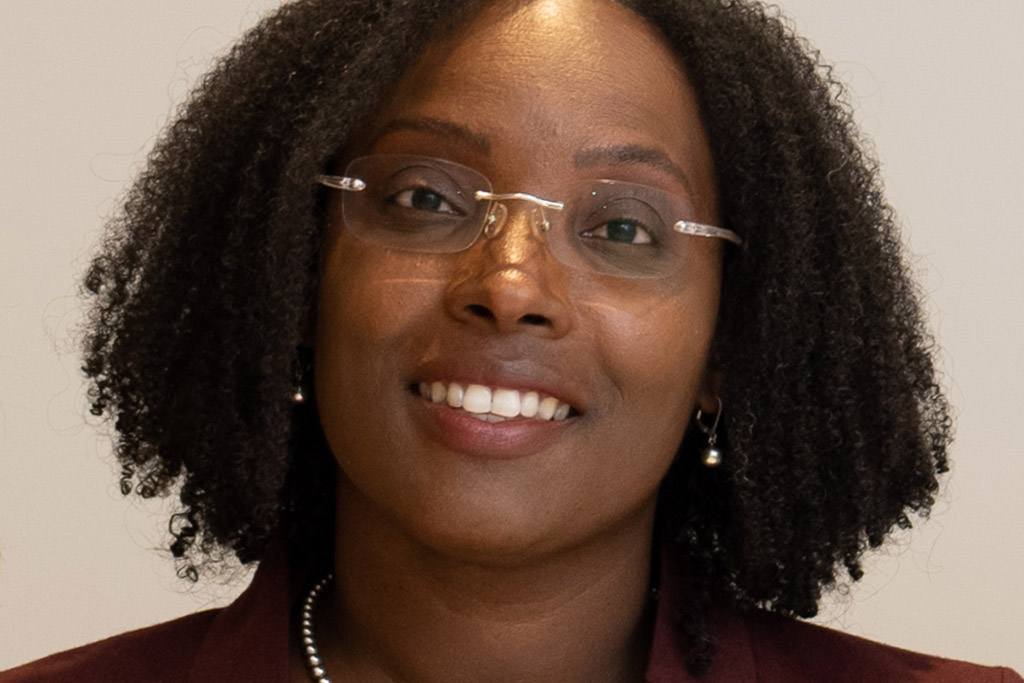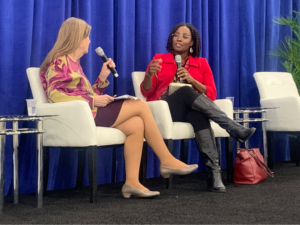June 15, 2023

I spend a lot of time with people who are trying to do very big things. Big, very difficult things. People I know are trying to get everyone included in the financial system. Trying to protect every financial consumer. Trying to shut down financial crime. Trying to remake global payments. Trying to prevent threats to privacy. Trying to change the very nature of money.
When you’re trying to do something huge, and you’re just starting out, you almost always have to do something small. That almost always means you have to be really, really smart in choosing that starting point. You have to choose a thing that’s doable, but that also, if done successfully, can be scaled up into something big. You choose small things that could change giant systems, and quickly — you look for the shortest route to big progress.
My guest today is doing one of the most exciting things I know of on this model. She is Delicia Reynolds Hand, Director of Financial Fairness at Consumer Reports, and she is trying to make consumer financial markets work really well for consumers by evaluating and rating the products of fintech firms.
Classic economic theory rests in part on the idea that markets are effective and efficient when they match a willing seller with a willing buyer, and the two set the price at which both want to transact. For this dynamic to work, the theory assumes that both parties have equal knowledge about the product. In consumer finance, though, that equality almost never exists. Sellers know much, much more than buyers do about consumer financial products. Even relatively sophisticated buyers struggle to understand the nuances of rates and fees, and the details of the terms and conditions, that tie to choices like credit cards, mortgages, home equity loans, investment opportunities, overdraft policies, insurance policies, and even savings and checking accounts.
For about a half century, U.S. public policy has aimed to solve this problem of asymmetrical knowledge by requiring companies to provide standardized disclosures on many kinds of products. After all this time, however, we have learned that disclosures actually don’t solve the problem. Most people don’t even read them, and those that do still often make suboptimal decisions. The sheer complexity of financial services gives providers a huge advantage. Furthermore, many financial choices, once made, are hard to unmake. Many services are long term, and many are “sticky,” hard to extricate from.
These thorny problems are the reason that many people, including me, have been excited about the advent of fintech. Over the past 10-15 years, digitally-native startups have set out to “disrupt” the incumbent industry (disrupt used to be their favorite word), by trying to give consumers different choices. Often, the new options are simpler. Often they are more transparent. They are often less expensive. They often eschewed hidden fees, or any fees at all, in areas where fees are a major source of revenue for incumbents. Fintechs often offer a promising alternative — so promising that, in emerging markets, it’s very common to find national economic and regulatory policy explicitly promoting digital financial services as a driver of financial inclusion and fairness.
But…are these fintech products actually better? We have surprisingly little information on how these innovative businesses are actually doing for the consumers they serve.
Enter Consumer Reports. Delicia is leading a new initiative that is evaluating fintechs. As most listeners probably know, Consumer Reports is a magazine that buys, tests and rates consumer products, from household cleansers to automobiles. Its value proposition is built around the rigor of its methodology and around its objectivity. Other entities rate and recommend financial products, and some of these are very useful, but most have business models in which they either receive fees from the companies they recommend and/or sell the consumer’s data. Consumer Reports, in contrast, is completely independent.
Given this combination of credibility and reach, one can envision the possibility that Consumer Reports' fintech ratings could, over time, profoundly shape the fintech marketplace and, therefore, the consumer financial marketplace overall. The initiative was the idea of my friend Kabir Kumar at Flourish Ventures, which has also provided financial support for launching it. Kabir has a gift for zeroing in on that doable, concrete, hard-to-see step that, if taken, could open up vast possibilities. In another example, he was one of the people in the CGAP group at the World Bank who realized years ago that the invention and rapid spread of the cell phone was making it possible to turn the world’s unbanked people — i.e. most of the people on the planet — into people inside the formal financial system. That insight has changed everything about global financial inclusion.
I have known Delicia for over a decade, since she was an official at the newly-launched Consumer Financial Protection Bureau and I served on its inaugural Consumer Advisory Board. We’ve had her on Barefoot Innovation before. We recorded today’s show last month in New York at the terrific Fintech Nexus conference (which used to be called LendIt). We were on a stage in the conference’s noisy exhibit center, so our format is a bit different from our unusual set up.
In our conversation, Delicia explains the goals and approach of her fintech initiative and their methodology for evaluating products. She shares fascinating findings on what they have already learned so far, in their first two rounds of research looking at areas like Peer to Peer payment apps and Buy Now Pay Later.
Importantly, she also shares their thinking on how to integrate these product evaluations into mainstream consumer choices. If you could do that well, you could leverage the natural forces of the marketplace to reward the most pro-consumer product designs and pricing. And that is a big goal worth achieving.

More about Delicia Reynolds Hand
Delicia Reynolds Hand is the Director of Financial Fairness at Consumer Reports. She leads CR’s digital finance testing and ratings strategy and its strategy on organizational marketplace change regarding consumer-friendly financial innovation. Through creating a reliable and iterative testing framework for digitized finance, she hopes to influence the fintech marketplace by examining company behaviors and practices, which impact outcomes for consumers. The goal is to dive deep and test whether fintech lives up to its promise.
Delicia previously was the Deputy Associate Director and Acting Associate Director for the Consumer Education & External Affairs Division at the Consumer Financial Protection Bureau. She has also served as Legislative Director at the National Association of Consumer Advocates; General Counsel at the Center for Community Change and Center for Community Change Campaign; and Senior Counsel/Legislative Director in the office of U.S. Representative John Sarbanes of Maryland.
More for our Listeners
Please find me on LinkedIn and on Twitter @JoAnnBarefoot and tell me what you think. If you enjoy Barefoot Innovation, it’s important to take a moment to leave us a five-star rating on your favorite podcast platform to expand our audience.
Watch for our upcoming episodes. We’ll have one with Jesse Van Tol, President and CEO of the National Community Reinvestment Coalition. We will be talking this month with Jessica Rusu, the head of innovation at the UK Financial Conduct Authority. And we will have Lisa Rice from the National Fair Housing Alliance, Paula Hunter from Mojaloop, and others.
On the conference circuit, this month, my colleague Nick Cook is speaking at the Salzburg Global Finance Forum. I’ll be speaking at the opening session of the American Bankers Association Risk and Compliance conference in San Antonio, and also in Zurich at the Point Zero conference, sponsored by Elevandi and the government of Switzerland. There I’ll be moderating a panel that includes Adrienne Harris, Superintendent of the New York Department of Financial Service; Bill Winters, Group Chief Executive of Standard Chartered; Marlene Amstad, Chairwomen of FINMA; and Ravi Menon, Managing Director of the Monetary Authority of Singapore. We will discuss the use of SupTech and RegTech in risk surveillance.
Our AIR team has four or five TechSprints in the works, including one on how to improve the mortgage lending process. You can register to observe that July sprint with the U.S. Federal Housing Finance Agency (FHFA).
Stay informed by joining our mailing list
